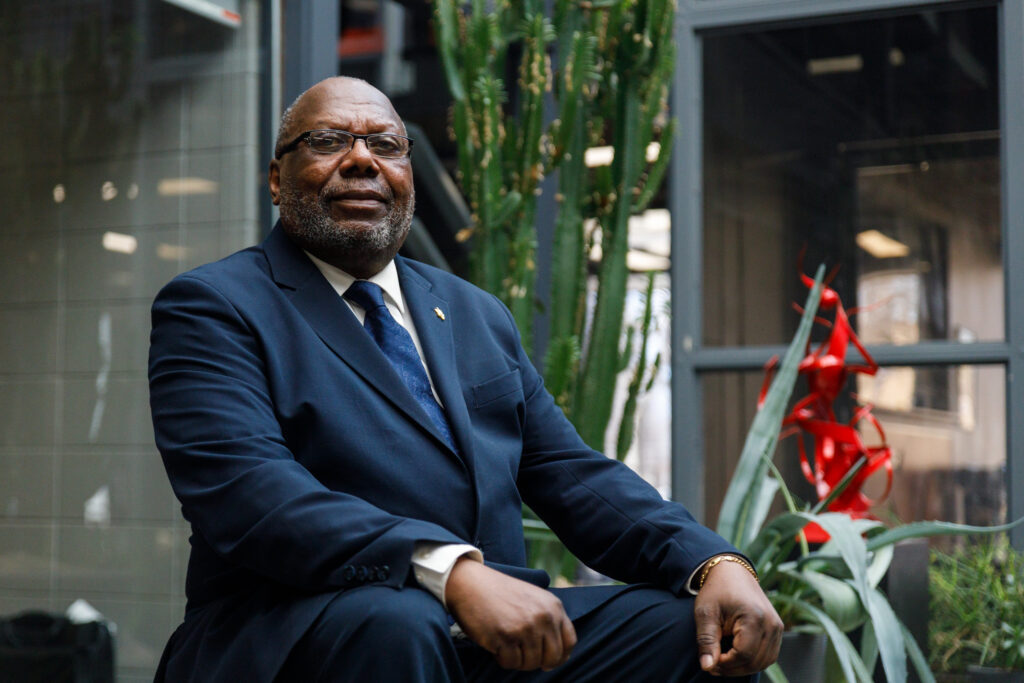Empathy Mental Health Targets ‘Urgent Need’ in Milwaukee’s Black Community
New nonprofit's leader Dwain Berry says lack of services has devastating impact.

Dwain Berry, chair of Empathy Mental Health, wants to connect Milwaukee’s Black community to mental health services. The lack of culturally responsive services, Berry says, has caused “devastation in the community.” (Photo by Julius Shieh)
A group of community leaders has announced the launch of Empathy Mental Health, a new nonprofit organization focused on “culturally responsive care.”
The organization, which will begin offering services by May 1, hopes to bring mental health treatment and social services to Milwaukee’s Black community.
Dwain Berry, the chairman of the nonprofit, said mental health access in Milwaukee’s Black community is approaching a critical point.
“I’ve seen so many things in this community that have caused these disparities that cause people to not be able to access treatment,” Berry said. “It’s really devastating – a lot of mental health issues have led people to do things like carjacking, shooting and stealing.”
Mental health problems, Berry said, are often difficult for people to address because of expensive treatment costs, social stigmas and a lack of access – all issues that Empathy Mental Health hopes to solve.
‘It’s personal’
Berry, a pastor, therapist and educator, has dedicated much of his career to mental health.
The founder of Berry’s Row, a housing organization, he has held leadership roles at organizations like the Milwaukee Detox Center, ARO Counseling Centers and Jewish Family Services.
But Berry’s introduction to mental health came from experiences in his own life.
“I had a brother that had mental health issues that led to alcoholism, and he ended up dying from his alcoholism,” Berry said. “It’s personal. Seeing my brother die, that’s personal.”
A lack of mental health services, Berry said, has caused “devastation in the community,” and he hopes that making options for healing available will help the community as a whole.
Mental wellness can often be tied directly to basic needs and material well-being, said Dr. Lia Knox, co-founder of Black Space, a therapy-centered community organization.
“People can’t begin to heal when they’re worried about food, housing or safety,” Knox said.
According to Knox, stigma around mental health is also a significant issue. “For generations, seeking therapy has been viewed as weakness—or not discussed at all,” Knox said.
Willy Brooks, a board member and pastor of The Upper Room Baptist Church, said that through Empathy Mental Health, he hopes to find new solutions that would be tailored to individuals and community members.
Using “a spiritual and holistic approach when dealing with community issues – we figured it could be impactful,” Brooks said.
Building trust
Berry said addressing mental health issues and finding solutions should also involve taking extra steps to support a client.
Existing services, Berry said, sometimes lack the cultural understanding necessary to build trust and support.
“Most places just throw medication at (people) and don’t really give them any real therapeutic treatment,” Berry said. “We want to use specific treatment techniques to address each individual client that comes in . . . “Every client that comes to a facility does not fit in the same box.”
This is all part of a holistic approach with clients, Berry said. “We’ll be working with housing issues, clothing issues, all of the things that they bring to the table.”
Part of this approach with clients also involves working with staff and professionals who know and understand the community they’re in, Brooks said.
“We will have people that look like our community involved in identification, diagnosis and treatment of clients,” Brooks said. “That’s going to be a huge, major difference. We’re going to be meeting people where they are.”
Another barrier Empathy Mental Health hopes to break is that of affordability.
As a nonprofit, Brooks hopes that funding sources such as grants and donations will be able to allow the organization to offer treatment to anybody, regardless of their insurance status or wealth.
“Anybody that comes for our services, we will service them.” Berry said. “If a client comes to us and does not have any insurance, then there’s different funding sources that we can pick up to pay for their treatment.
For more information
Empathy Mental Health will be up and running by May 1, Berry said. Services offered will include the following:
● Psychiatric diagnostic assessments
● Psychotherapy using evidence-based techniques such as cognitive behavioral therapy, or CBT, and dialectical behavior therapy, or DBT
● Medication-assisted therapy
● Case management
● Psychoeducation
Empathy Mental Health’s offices will be located at 2819 W. Highland Blvd.
Empathy Mental Health seeks to address ‘urgent need’ in Milwaukee’s Black community was originally published by the Milwaukee Neighborhood News Service.
If you think stories like this are important, become a member of Urban Milwaukee and help support real, independent journalism. Plus you get some cool added benefits.






















we need more help!